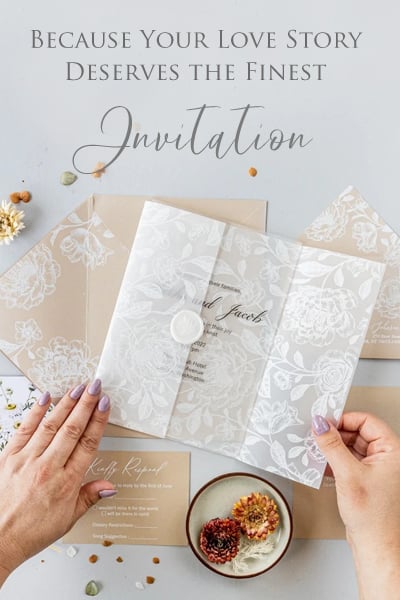
Planning a wedding is an exciting and meaningful endeavor, and while many couples enlist the help of a wedding planner to navigate the process, planning a wedding without a professional can be a rewarding and budget-friendly option. By taking on the role of the planner yourselves, you have the opportunity to personalize every aspect of your special day and maintain greater control and involvement in the decision-making process. Planning a wedding without a wedding planner allows for cost savings, as you can allocate your budget towards areas that are most important to you as a couple. To successfully plan your wedding without a wedding planner, there are several essential steps to follow. These include:
- Establishing a budget
- Creating a timeline and checklist
- Finding reliable vendors
- Selecting and booking the venue
- Choosing a wedding theme and style
- Planning the ceremony and reception
- Designing invitations and wedding stationery
- Organizing transportation and accommodations
- Arranging for catering and menu selection
- Selecting and coordinating the wedding party
- Planning and coordinating the wedding day schedule
In addition to these steps, there are extra tips to ensure the success of your DIY wedding planning, such as:
- Delegating responsibilities
- Utilizing online wedding planning resources
- Attending wedding expos and workshops
- Seeking support from friends and family
- Staying organized with the help of a checklist
By following these guidelines, you can plan a beautiful and memorable wedding without the need for a wedding planner.
Key takeaway:
- Cost Savings: Planning a wedding without a wedding planner can lead to significant cost savings, allowing couples to allocate their budget more efficiently.
- Personalization and Flexibility: Without a wedding planner, couples have more freedom to personalize their wedding, making it a unique reflection of their style and preferences. They can also make last-minute changes or adjustments more easily.
- Greater Control and Involvement: Planning a wedding without a planner gives couples full control over every aspect of their big day. They can be actively involved in decision-making and have a hands-on experience throughout the planning process.
Benefits of Planning a Wedding Without a Wedding Planner
Planning a wedding without a wedding planner comes with some incredible benefits. From cost savings to personalization and flexibility, and not to mention greater control and involvement, you'll be amazed at what you can achieve. Imagine putting that extra money towards the honeymoon of your dreams or adding those special touches that truly reflect your unique love story. With this approach, you get to steer the ship and create a day that's authentically yours. It's time to discover just how empowering planning a wedding without a wedding planner can be.
Cost Savings
Planning a wedding without a wedding planner can result in significant cost savings. Here are some ways you can save money:
- 1. DIY Decorations: Instead of hiring a professional decorator, create your own centerpieces, floral arrangements, and other decorations. This can save you a substantial amount of money, as you only need to cover the cost of materials.
- 2. Choose a Budget-Friendly Venue: Selecting a venue that is affordable and offers flexibility can help you save on rental fees. Consider options such as public parks, community centers, or family-owned properties.
- 3. Catering Options: Opt for a buffet-style or family-style meal instead of plated dinners, as it can be more cost-effective. You can also explore self-catering options or opt for a food truck instead of a traditional catering service.
- 4. DIY Invitations: Design and print your own invitations using online templates or software. This eliminates the need to hire a professional stationer and can save a significant amount of money.
- 5. Borrow or Rent Items: Instead of purchasing all the necessary items for your wedding, consider borrowing or renting them. This includes items like tables, chairs, linens, and even wedding attire.
By implementing these cost-saving measures, you can enjoy a beautiful wedding while staying within your budget.

Personalization and Flexibility
When planning a wedding without a wedding planner, there are several advantages that come with personalization and flexibility. Here are some key points to consider in order to incorporate personalization and flexibility into your wedding:
- Customize every detail: One of the benefits of planning your own wedding is that you have the freedom to tailor every aspect to your preferences. From selecting the theme and style to choosing the decorations, you can create a wedding that truly reflects your personality.
- Flexibility in decision-making: Without a wedding planner, you have the flexibility to make changes and adjustments throughout the planning process. Whether it's modifying the timeline, altering the menu, or even switching venues if needed, you can ensure that your wedding is exactly how you envision it.
- Add personal touches: Planning your wedding on your own gives you the opportunity to include meaningful and sentimental elements that are important to you as a couple. Whether you decide to incorporate family heirlooms, write personalized vows, or create DIY decorations, you can infuse your wedding with unique touches that make it special.
- Control over the budget: By planning your wedding without a wedding planner, you have complete control over the budget. You can allocate funds according to your priorities and make informed decisions about where to splurge and where to save.
- Flexibility in vendor selection: Without a wedding planner, you have the freedom to choose the vendors that align with your vision and budget. You can research and personally meet with potential vendors, ensuring that they understand your needs and can provide the level of service you desire.
By taking charge of your own wedding planning, you can incorporate personalization and flexibility into every aspect, allowing you to create the wedding of your dreams.
Greater Control and Involvement
Embrace greater control and involvement in decision-making: When planning a wedding without a wedding planner, you have the opportunity to take charge of every aspect of your special day. From choosing the venue to selecting the decorations, you can make decisions that align perfectly with your vision and preferences, allowing for greater control and involvement.
Immerse yourself fully in the planning process: With no wedding planner to handle all the details, you can fully immerse yourself in the planning process. This allows you to be more hands-on and involved in every step, ensuring that everything turns out exactly how you envision it. By having greater control and involvement, you can create a personalized experience for yourself and your guests.
Create a truly personalized experience: Without a wedding planner, you have the freedom to personalize every aspect of your wedding. From the theme and style to the food and entertainment, you can incorporate your unique tastes and preferences, making your special day truly reflective of you as a couple. By having greater control and involvement, you can ensure that every detail showcases your individuality.
Save on costs and allocate your funds wisely: Planning a wedding without a wedding planner can significantly reduce your expenses. Without the additional fees associated with hiring a planner, you have more control over your budget. You can allocate your funds to the areas that matter most to you, allowing for greater control and flexibility in decision-making.
Embrace flexibility in decision-making: Planning without a wedding planner allows for greater flexibility. You can be more spontaneous, make last-minute changes if necessary, and adapt to any unforeseen circumstances that may arise. With greater control and involvement, you can navigate through any challenges that come your way and ensure that your wedding day is a success.
History is filled with examples of individuals who took on the responsibility of planning their own weddings. From small and intimate gatherings to grand events, couples throughout time have embraced the challenge of orchestrating a celebration that truly represents their love and commitment. By assuming greater control and involvement in the wedding planning process, these couples were able to create unique and memorable experiences for themselves and their guests. From designing the perfect invitations to curating a personalized menu, these couples left no stone unturned in their quest to make their special day truly unforgettable. Through careful decision-making, attention to detail, and a touch of creativity, they were able to bring their vision to life and celebrate their love in a way that was truly reflective of their unique personalities. So, if you are considering planning your wedding without a wedding planner, take inspiration from those who have come before you and embrace the opportunity to create a celebration that is entirely your own.
Steps to Plan a Wedding Without a Wedding Planner
Planning a wedding without a wedding planner can be a daunting task, but fear not! In this section, we will walk you through the essential steps to seamlessly plan your special day. From establishing a budget and creating a timeline to finding reliable vendors and choosing the perfect venue, we've got you covered. Whether you're envisioning a rustic outdoor affair or a glamorous ballroom celebration, we'll guide you through selecting the wedding theme and style. So let's dive in and ensure that every detail, from the invitations to the catering, comes together flawlessly.
Establish a Budget
- To successfully establish a budget for planning a wedding without a wedding planner, you need to calculate your total wedding budget. Determine the maximum amount you are willing to spend on your wedding.
- List all the necessary expenses to include categories such as venue, catering, attire, decorations, photography, and transportation.
- Research and gather price quotes from different vendors to compare prices and choose the ones that fit within your budget.
- Allocate a specific budget for each expense category, determining how much you are willing to spend on each aspect of your wedding.
- Consider additional costs and unexpected expenses, setting aside a contingency fund to cover any unforeseen circumstances.
- Monitor your spending throughout the planning process, keeping track of your expenses and making adjustments as needed to stay within your budget.
- Prioritize your spending based on what is most important to you, focusing your budget on the elements of your wedding that matter the most to you.
- Find creative ways to save money by looking for discounts, considering DIY options, and negotiating with vendors to get the best deals.
- Always leave room for unexpected expenses. It's essential to have some flexibility in your budget to account for any last-minute changes or additions.
- Regularly review and reassess your budget as your wedding planning progresses. You may need to make adjustments and reallocate funds.
By following these steps, you can establish a budget for your wedding without a wedding planner and ensure that you stay within your financial means while planning your special day.
Create a Timeline and Checklist
- Create a Timeline and Checklist: When planning a wedding without a wedding planner, one of the most important things to do is to create a timeline and a checklist. This will help you stay organized and ensure that everything is on track.
- Start Early: Begin by determining your wedding date and work backward from there. Make sure to allow yourself ample time to complete all the necessary tasks mentioned in your timeline and checklist.
- List Key Milestones: Identify the major milestones in the wedding planning process and include them in your timeline and checklist. These milestones can include booking the venue, choosing the dress, and sending out invitations.
- Break It Down: Divide the time between major milestones into smaller tasks. This will make the process more manageable. For example, if you have six months until your wedding day, allocate specific periods for finding vendors, finalizing the menu, and arranging transportation.
- Assign Deadlines: Set deadlines for each task mentioned in your timeline and checklist. This will keep you on schedule and prevent any last-minute rush.
- Stay Flexible: It's important to remain flexible when creating your timeline and checklist. Wedding planning can be unpredictable, so be prepared to make adjustments as needed due to unexpected changes or delays.
- Regularly Review and Update: Make it a habit to regularly review your timeline and checklist. This will enable you to track your progress and make any necessary updates. It's crucial to ensure that nothing falls through the cracks.
Creating a timeline and checklist is essential when planning a wedding without a wedding planner. By following the steps mentioned above, you can stay organized and complete all the necessary tasks leading up to your wedding day. Make sure to regularly review and
update your timeline and checklist to stay on track with your wedding preparations.
Find Reliable Vendors
When planning a wedding without a wedding planner, it is essential to find reliable vendors to ensure a smooth and successful event. Here is a step-by-step guide to help you find the right vendors for your wedding:
- Research and gather a list of potential vendors in your area. Look specifically for vendors who specialize in weddings and have experience in the type of wedding you are planning in order to find reliable vendors.
- Read reviews and testimonials from previous clients to get an idea of the vendor's reputation and the quality of their work, which will help you in finding reliable vendors.
- Ask for recommendations from friends, family, or other couples who have recently planned a wedding. Personal recommendations can be invaluable when it comes to finding trustworthy vendors.
- Contact the vendors on your list and schedule consultations or meetings with them. This will give you an opportunity to evaluate their professionalism, communication skills, and determine if their style aligns with your vision, helping you find reliable vendors.
- Ask the vendors for references and reach out to their previous clients, which will allow you to obtain honest feedback about their experience working with the vendor in order to find reliable vendors.
- Discuss pricing, contracts, and any additional services or packages that the vendor offers. It is crucial to have a clear understanding of the costs and terms before making any decisions related to finding reliable vendors.
- Compare the vendors based on their expertise, availability, pricing, and how well they understand your vision for the wedding. This will help you narrow down your options and find reliable vendors.
- Make a final decision and secure the services of your chosen vendors by signing a contract and paying any required deposits. It is essential to ensure that all details and expectations are clearly outlined in the contract when finding reliable vendors.
Remember that finding reliable vendors is crucial to the success of your wedding. Take the time to conduct thorough research, gather recommendations, and conduct interviews to ensure you find vendors who understand your vision and can deliver the quality and service you desire for your special day.

Select and Book the Venue
When planning a wedding without a wedding planner, selecting and booking the venue is a crucial step. Here are the steps to follow for this stage:
- Research potential venues that align with your preferences, budget, and wedding theme.
- Visit the shortlisted venues in person to get a better idea of their atmosphere, amenities, and layout. Take note of their availability for your desired wedding date.
- Consider the capacity of each venue to accommodate your guest list comfortably.
- Evaluate the cost and packages offered by each venue. Take into account any additional charges for catering, decor, or other services.
- Negotiate the terms and conditions with the venue representative, such as the deposit, payment schedule, cancellation policy, and any restrictions.
- Review and sign the contract once you are satisfied with the venue's offerings and policies.
- Make the necessary deposit and secure the date for your wedding.
- Inform your wedding vendors about the chosen venue and coordinate with them accordingly.
- Finalize any necessary permits or licenses required by the venue for your event.
Selecting and booking the venue for your wedding is a crucial decision that sets the tone for your special day. It is important to select and book the venue considering factors such as the location, capacity, cost, and ambiance to ensure that it aligns with your vision. With careful research, visits, and negotiations, you can select and book the perfect venue that will make your wedding truly memorable.
Choose the Wedding Theme and Style
When it comes to planning a wedding without a wedding planner, one important aspect to consider is choosing the wedding theme and style. Here are some factors to keep in mind:
- Budget: Consider the budget you have allocated for your wedding and choose a theme that aligns with it. Some themes may require more decorations or specific elements that could impact your overall costs.
- Personal Preferences: Think about your personal style and what reflects you as a couple. Do you prefer something traditional, modern, rustic, bohemian, or perhaps something completely unique? Let your preferences guide your decision when choosing the wedding theme and style.
- Venue: Consider the venue where your wedding will take place. Some venues naturally lend themselves to certain themes. For example, a garden venue may be perfect for a romantic or floral-themed wedding, while a beachfront location may be ideal for a nautical or tropical wedding theme and style.
- Season: Take into account the season in which your wedding will occur. Certain themes, colors, and styles may be more fitting for different seasons. For instance, a winter wedding could embrace a cozy and elegant wedding theme and style, while a summer wedding may feature vibrant and outdoorsy elements.
- Guest Experience: Consider the overall experience you want to create for your guests. Think about how the wedding theme and style will impact the atmosphere, decorations, and activities at the wedding.
By taking these factors into consideration, you can choose the wedding theme and style that truly reflects your personality and creates a memorable experience for you and your guests.
Plan the Ceremony and Reception
When planning the ceremony and reception for your DIY wedding, it is essential to carefully plan and organize multiple key elements to ensure a successful and memorable event.
- Create a detailed timeline and checklist for the day to plan the ceremony and reception effectively. This will help you stay organized and ensure that everything runs smoothly.
- Decide on the type and style of ceremony you desire, whether it's a traditional religious ceremony or a more unique and alternative celebration. Consider the venue and its atmosphere when making this decision.
- Select a venue that perfectly suits your style and budget for the ceremony and reception. Look for a place that can accommodate your desired guest count and has all the necessary facilities and amenities.
- Design the layout and decorations for both the ceremony and reception spaces. Take into consideration the theme and colors of your wedding to create a visually appealing and cohesive atmosphere.
- Choose the music and entertainment for each part of the wedding, whether it's a live band, DJ, or playlist. Ensure that the music reflects your personal taste and sets the right mood.
- Arrange for any required equipment and rentals, including chairs, tables, tents, lighting, and audiovisual equipment. Check that everything is in place and functioning properly before the start of the wedding.
- Select a menu and coordinate with a catering service to provide food and beverages for the reception. Take into account any dietary restrictions or preferences of your guests and ensure there are options available for everyone.
- Organize transportation for the wedding party and guests if needed. This may involve hiring a shuttle service or arranging for taxis or rideshares to ensure everyone can comfortably reach the venue.
- Communicate effectively with your wedding party and vendors to coordinate the ceremony and reception. Make sure everyone understands their roles and responsibilities and provide any necessary information or instructions.
- Plan and schedule the various events and activities that will take place during the reception, such as speeches, dances, and games. Maintain a clear timeline for the evening to ensure a seamless flow of events.
Fact: Planning the ceremony and reception for your DIY wedding allows you to have complete control over every aspect of your special day.
Designing the Invitations and Wedding Stationery
Designing the invitations and wedding stationery is a vital aspect of planning a wedding without the assistance of a wedding planner. Below are steps to help you through the process:
- Gather inspiration: Look for design ideas and styles that resonate with your wedding theme and personal preferences. Browse through wedding magazines, websites, and social media to gather inspiration.
- Choose a color scheme: Select a color palette that complements your wedding theme. Consider incorporating your wedding colors into the invitations and stationery for a cohesive look.
- Select the invitation style: Decide on the type of invitation you want, such as traditional, modern, or rustic. Choose the format (folded, flat, or pocket) and the size that suits your preferences.
- Create the design: Utilize graphic design software or seek the assistance of a graphic designer to create your invitations. Incorporate elements like motifs, monograms, or illustrations that reflect your wedding theme.
- Add the necessary information: Include details such as the wedding date, time, venue, and RSVP information. Make sure to double-check for accuracy.
- Choose appropriate fonts: Select legible fonts that match the overall design aesthetic. Consider combining script and serif or sans-serif fonts for an elegant and visually appealing look.
- Consider embellishments: Determine if you'd like to include embellishments like ribbons, lace, or wax seals to enhance the invitations. Keep in mind that these may require additional time and resources.
- Select matching stationery: Create cohesive stationery pieces that align with the invitation design, including save-the-dates, programs, menus, place cards, and thank-you cards.
- Print and assemble: Once the design is finalized, choose a professional printing service or print them at home based on your budget and preferences. Assemble the invitations and stationery with care.
- Address and send: Write the addresses neatly or hire a calligrapher for an elegant touch. Send out the invitations within the appropriate timeline to allow sufficient time for responses.
Designing your own wedding invitations and stationery enables you to add a personal touch and maintain control over the design process. It also allows you to customize the materials, colors, and styles to suit your vision for the wedding.
Organize Transportation and Accommodations
- Organize transportation options: Begin by organizing different transportation options for your wedding day, such as limousines, party buses, or vintage cars. Look for companies that have experience providing transportation for weddings and read reviews to ensure their reliability.
- Consider guest accommodations: If you have out-of-town guests attending your wedding, it's important to organize their accommodations. Research nearby hotels or bed and breakfasts and negotiate group rates if possible. Provide your guests with information about these accommodations and any transportation options available to them.
- Choose the right transportation for the wedding party: Decide on the type of transportation you want for the wedding party. This could include organizing a limousine, vintage car, or even a horse-drawn carriage. Consider the size of your wedding party and choose a mode of transportation that can accommodate everyone comfortably.
- Coordinate pick-up and drop-off locations: Discuss with your transportation provider the pick-up and drop-off locations for various wedding events, such as the ceremony, reception, and any additional locations for photoshoots. Ensure that all drivers are aware of the schedule and have clear directions to each location.
- Communicate with guests about transportation details: Provide your guests with information about transportation to and from your wedding venue. Include details about any shuttles or transportation services you have organized, as well as options for rideshare services or taxi companies in the area.
By organizing transportation and accommodations effectively, you can ensure that both you and your guests have a seamless and enjoyable experience on your wedding day.
Arrange for Catering and Menu Selection
When planning a wedding without a wedding planner, one of the most important steps to consider is arranging for catering and menu selection.
To begin, decide on the style and theme of your wedding. This will help you determine the type of cuisine that suits your vision.
Next, make a guest count and finalize your budget. Knowing the number of guests will help you estimate the amount of food and the budget you can allocate for catering.
Now it's time to research and contact different catering companies or individual caterers. Ask for recommendations from friends or family and read reviews to ensure their reliability.
Once you have a shortlist, arrange for a tasting session to sample their food. This will help you determine the quality and taste of their dishes.
During the tasting, be sure to discuss your menu preferences and any dietary restrictions with the caterer. Provide them with a variety of options to accommodate different tastes and dietary needs.
After the tasting, it's time to finalize the menu selection with the caterer. Consider offering a variety of appetizers, main courses, and desserts to cater to different preferences.
Don't forget to discuss the logistics of the catering service, such as setup, serving staff, and clean-up. Ensure the caterer can provide all the necessary equipment and personnel to make your wedding run smoothly.
Once all the details are ironed out, confirm the specifics of the catering contract, including the date, time, menu items, and payment terms. Make sure you have a clear understanding of their cancellation and refund policies as well.
Pro-tip: Always communicate any changes or updates to your caterer in a timely manner to avoid any confusion or last-minute issues. Keeping an open line of communication will ensure a successful catering experience for your wedding.
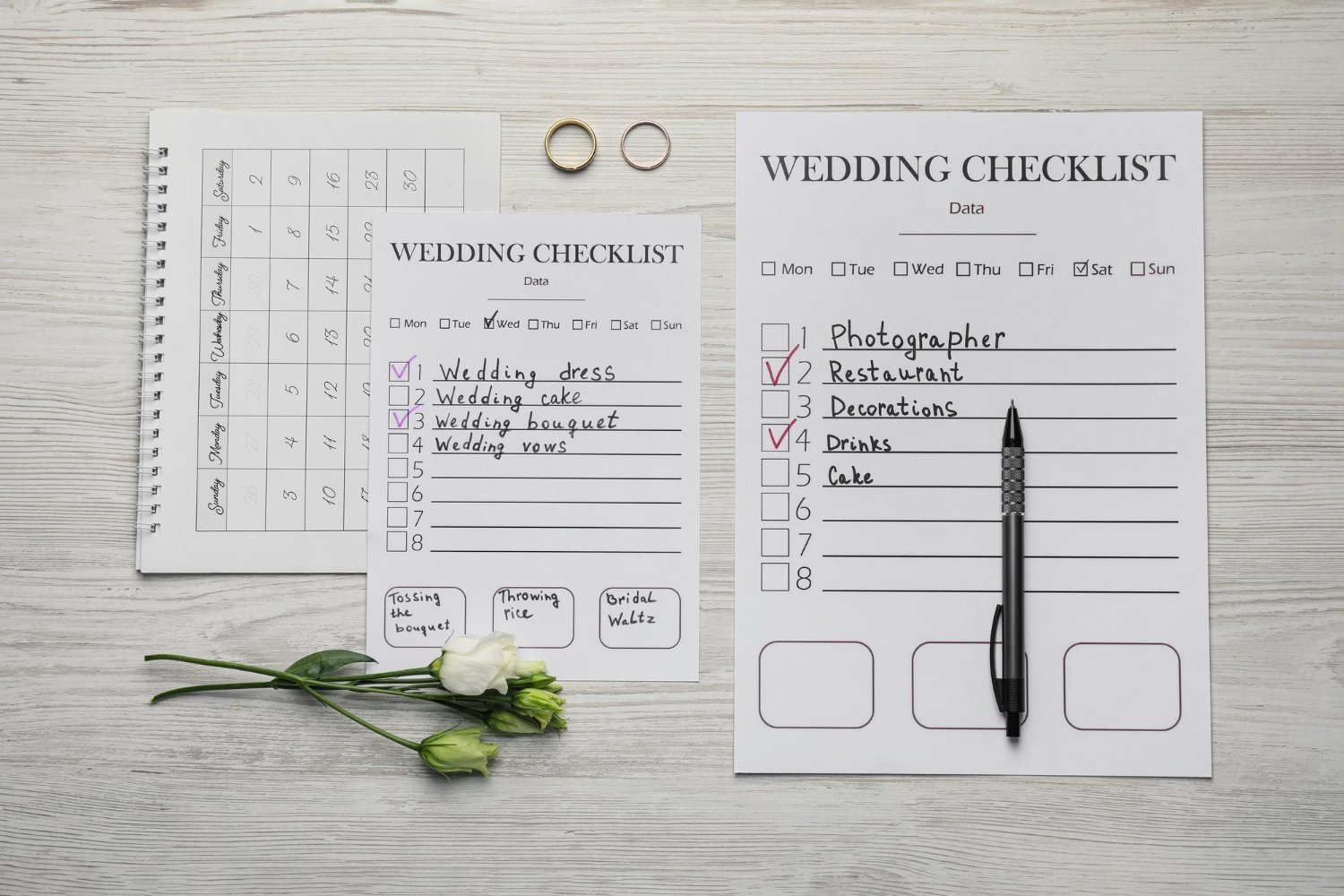
Select and Coordinate the Wedding Party
When planning a wedding without a wedding planner, it is crucial to select and coordinate the wedding party. Here are some steps to help you successfully manage this task:
- Choose the right individuals: Select friends and family members who are reliable, organized, and willing to actively participate in the wedding planning process. Ensure that they are committed to their roles and will be available throughout the planning period.
- Assign specific responsibilities: Clearly define the roles and responsibilities for each member of the wedding party. Assign tasks such as organizing bridal showers, bachelor/bachelorette parties, and helping with any DIY projects.
- Regular communication: Maintain open lines of communication with the wedding party to keep everyone informed about important dates, deadlines, and any changes in the wedding plans. Utilize group chats or email threads to easily keep everyone updated.
- Coordinate attire: Work closely with the wedding party to decide on the appropriate attire for the big day. Consider the wedding theme, colors, and any specific requirements. Provide guidance and support to ensure everyone looks cohesive and polished.
- Plan rehearsals and rehearsal dinners: Schedule and coordinate wedding rehearsals, making sure the wedding party is aware of the details and timings. Organize rehearsal dinners to show appreciation for their involvement and to provide an opportunity for everyone to connect.
- Offer support and guidance: Be available to address any questions or concerns the wedding party may have. Provide guidance on etiquette, protocol, and any specific expectations associated with their roles.
- Show gratitude: Remember to express gratitude and appreciation to each member of the wedding party for their time, effort, and support. Consider personalized gifts or heartfelt gestures to thank them for their contributions.
Plan and Coordinate the Wedding Day Schedule
When planning a wedding without a wedding planner, it's essential to meticulously plan and coordinate the wedding day schedule to guarantee a smooth and successful event. Here are the steps to follow:
- Start early: Begin by meticulously planning a detailed timeline for the entire wedding day. Determine the start and end times for each significant event, such as the ceremony, cocktail hour, reception, and any other activities.
- Break it down: Divide the day into smaller time increments, like 15-minute or 30-minute intervals, to effectively allocate sufficient time for each task or event. This systematic approach will assist you in staying on track and ensuring everything runs according to plan.
- Coordinate with vendors: Reach out to your vendors, such as the photographer, videographer, and caterer, to share the schedule. Collaborate with them to ensure they are aware of their specific time slots and any special instructions.
- Communicate with your wedding party: Inform your wedding party about the schedule, including when and where they need to be for photos, speeches, and any other important moments. Encourage them to arrive early to avoid any delays.
- Plan for contingencies: Anticipate potential challenges or delays and have backup plans in place. For example, if it's an outdoor wedding, have a contingency plan in case of bad weather. Ensure everyone involved is aware of these backup plans.
- Assign a point person: Designate someone reliable, such as a responsible friend or family member, to be in charge of executing the schedule and coordinating with vendors. This person should ensure everyone is where they need to be at the specified times.
- Stay organized: Keep all necessary documents, contact information, and schedules in one place to easily reference them throughout the day. This will help you stay on top of things and quickly address any changes or issues that may arise.
- Regularly update and review the schedule: As the wedding day approaches, periodically review and update the schedule to account for any last-minute changes or additions. Share the updated schedule with all relevant parties to keep everyone informed.
By diligently following these steps and effectively planning and coordinating the wedding day schedule, you can ensure a seamless and memorable wedding celebration without the need for a wedding planner.
Extra Tips for Successful DIY Wedding Planning
Planning a wedding without a wedding planner can be a daunting task, but fear not! In this section, we've got you covered with some extra tips to ensure your DIY wedding planning is a success. From delegating responsibilities to utilizing online resources, attending expos, and seeking support from loved ones, we'll explore various strategies to make your wedding planning journey smoother. So, get ready to dive in and discover the secrets to creating your dream wedding without the need for a professional planner.
Delegate Responsibilities
When planning a wedding without a wedding planner, delegate responsibilities are crucial for a successful event. By assigning tasks to trusted individuals, you can ensure that everything runs smoothly and reduce your own workload.
- Assign a point person for each major aspect of the wedding, such as decorations, catering, and photography. This person will be responsible for coordinating with vendors, making decisions, and keeping you updated.
- Delegate specific tasks to family members and close friends who are willing to help. For example, ask someone to handle RSVPs, someone else to assist with the seating arrangement, and another person to oversee the guest book.
- Consider creating a wedding committee consisting of close friends or family members who can work together to divide and conquer tasks. This not only lightens the load but also fosters a sense of collaboration.
- Communicate clearly with your delegates, providing them with all the necessary information and guidelines. Make sure they are aware of deadlines, expectations, and any special instructions.
- Trust in your delegates' abilities and be open to their suggestions and ideas. Remember that they are there to support you and make the planning process easier.
Pro-tip: Regularly check-in with your delegates to ensure that tasks are being completed on time and to address any questions or concerns. Schedule regular meetings or communicate through a group chat or email thread to keep everyone in the loop. By effectively delegating responsibilities, you can alleviate stress and focus on enjoying your special day.
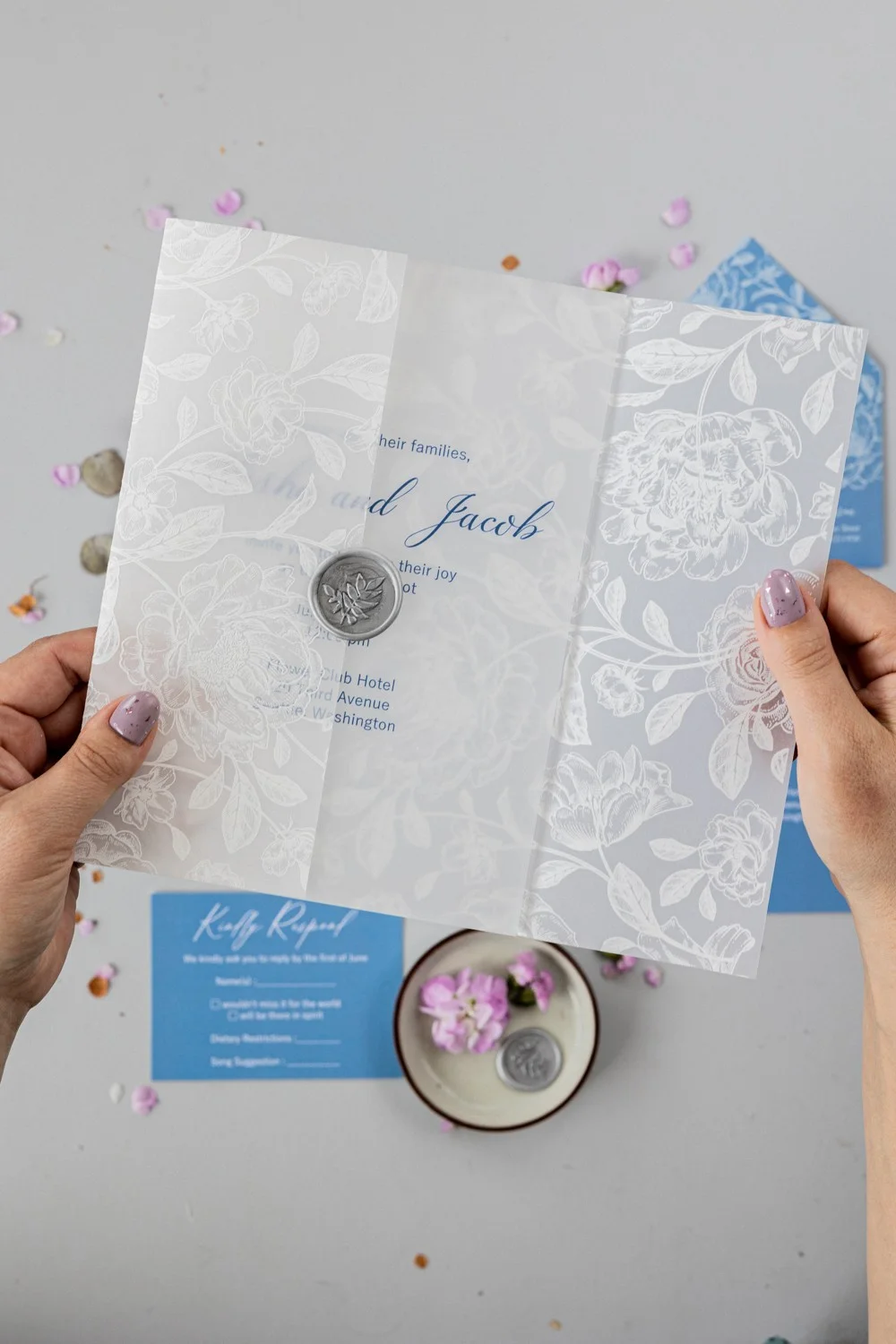
Utilize Online Wedding Planning Resources
- Utilize online wedding planning websites and platforms that offer a range of helpful tools and resources.
- Utilize online wedding planning tools such as budget calculators, guest list managers, and seating arrangement generators to stay organized.
- Take advantage of online wedding checklists and timelines to ensure all tasks are completed in a timely manner.
- Explore online wedding forums and communities to connect with other couples planning their weddings and seek advice or recommendations.
- Use online wedding vendor directories to find and compare reliable vendors in your area, such as photographers, florists, and caterers.
- Read online wedding blogs and articles for inspiration, tips, and advice on various aspects of wedding planning.
- Watch video tutorials and webinars on online platforms to learn about specific wedding planning topics, such as DIY decorations or wedding dress shopping tips.
- Utilize online wedding invitation websites to create and customize your wedding invitations, RSVP cards, and other stationery.
- Take advantage of online wedding planning apps and tools that allow you to access all your planning information on your phone or tablet.
- Consider signing up for online wedding planning courses or workshops to enhance your wedding planning skills and knowledge.
Attend Wedding Expos and Workshops
When organizing a wedding without the assistance of a wedding planner, it can be highly advantageous to attend wedding expos and workshops. Here are several steps you can follow:
- Conduct research: Initiate your search for upcoming wedding expos and workshops in your locality. Refer to local event listings, bridal magazines, or wedding websites to gather information on forthcoming events.
- Select wisely: Choose the wedding expos and workshops that align with your specific requirements. Consider the themes, topics, and vendors that will be present at each particular event.
- Make a point to attend: Prioritize attending the chosen wedding expos and workshops. Mark the event dates on your calendar and reserve time to actively engage in the activities of the event.
- Acquire knowledge: Take advantage of the educational opportunities at these events. Participate in seminars and workshops focusing on wedding planning, budgeting, décor, and more. Take thorough notes and ask questions to enhance your understanding.
- Establish connections: Engage with vendors and experts at the wedding expos and workshops. Utilize this chance to meet and network with professionals who can help turn your wedding vision into reality.
- Explore: Explore the various booths and exhibits at the wedding expo. Gather inspiration for wedding themes, decorations, and styles. Take note of any vendors or services that capture your interest.
- Collect valuable resources: Obtain brochures, business cards, and other materials from vendors and experts at the wedding expos and workshops. These resources can be highly useful when making decisions about your wedding.
- Follow up accordingly: After the wedding expo or workshop, follow up with any vendors or experts you connected with. Schedule appointments or consultations to further discuss your wedding plans and explore potential collaborations.
By actively participating in wedding expos and workshops, you can acquire valuable insights, gather ideas, and establish connections that will enhance your experience of DIY wedding planning.
Seek Support from Friends and Family
When planning a wedding without a wedding planner, it is important to seek support from friends and family. Their assistance, advice, and help can greatly contribute to ensuring a successful event.
- Emotional support: Friends and family can be a valuable source of emotional support throughout the wedding planning process. They can offer encouragement, understanding, and a listening ear during moments of stress or anxiety.
- Task delegation: By seeking support from loved ones, you can delegate specific tasks and responsibilities to them. For example, you can ask a close friend to help with researching and contacting vendors, while a family member can assist with DIY projects or decorations.
- Expertise and skills: Friends and family members may have experience or skills that can be beneficial for your wedding planning. They can contribute their expertise in areas such as photography, event coordination, or design, which can save you money and enhance the overall quality of the wedding.
- Connections and networks: Your friends and family may have connections within the wedding industry or know reputable vendors that can offer discounts or special deals. They can help you find reliable and affordable services, such as caterers, photographers, or musicians.
- Planning assistance: Planning a wedding can be overwhelming, but with the help of friends and family, you can divide tasks and share the workload. This can ensure that no detail is overlooked and that the planning process runs smoothly.
By seeking support from friends and family, you can not only alleviate some of the stress associated with planning a wedding without a wedding planner but also create meaningful and memorable moments throughout the process.
Stay Organized and Maintain a Checklist
To effectively organize your wedding planning process without a wedding planner, it is essential to maintain a checklist and follow these steps:
- Establish a timeline: Set specific deadlines for each task to ensure everything is completed in a timely manner and keep you on track.
- Create a master checklist: Make a detailed checklist of all tasks required for your wedding. Divide each task into smaller, manageable steps.
- Prioritize tasks: Determine the urgency and importance of each task, and prioritize accordingly. This will help you focus on the most critical tasks.
- Use an organizer: Choose an organization method that suits your preferences. You can opt for a wedding planning app, a digital spreadsheet, or a physical planner to keep track of deadlines and your checklist.
- Regularly update and review your checklist: As you complete tasks and encounter new ones, ensure your checklist reflects the current status. Regular review avoids any oversight or missed tasks.
Pro-tip: Enhance your checklist by color-coding tasks or using a labeling system to categorize them by priority or type. This will facilitate identification and prioritization of the most important tasks.
Some Facts About How To Plan a Wedding Without a Wedding Planner:
- ✅ Planning a wedding without a wedding planner can be overwhelming, but it is possible. (Source: Singaporebrides | Weddings 101, December 2020)
- ✅ Setting a wedding budget and sticking to it is essential when planning without a wedding planner. (Source: Singaporebrides | Weddings 101, December 2020)
- ✅ Creating a wedding checklist can help couples stay organized when planning without a wedding planner. (Source: Singaporebrides | Weddings 101, December 2020)
- ✅ Researching and booking vendors early on is important for couples planning their own wedding. (Source: Singaporebrides | Weddings 101, December 2020)
- ✅ Delegating tasks to family and friends can provide valuable support and assistance during the wedding planning process. (Source: Singaporebrides | Weddings 101, December 2020)
Frequently Asked Questions
Should I hire a wedding planner if I'm planning a simple ceremony with a smaller budget?
Hiring a wedding planner can still be beneficial, even for a simple ceremony with a smaller budget. They have the experience and connections to help you allocate your budget efficiently and make the best use of your funds. They can also help with time management, decision making, and handling any last-minute events. However, if you're confident in your ability to stick to your budget and have a clear vision for your wedding day, you may be able to plan without a professional wedding planner.
What are some affordable resources for planning a wedding without a wedding planner?
There are several affordable resources available for couples planning their wedding without a wedding planner. You can utilize free or affordable wedding planning templates from websites like Etsy to help with budgeting, timelines, and checklists. Wedding planning books and online resources can also provide guidance and inspiration. Additionally, wedding expos and bridal shows can be helpful for finding vendors and getting ideas at a lower cost.
Is it necessary to hire a day-of coordinator for my wedding?
While not necessary, hiring a day-of coordinator (DOC) can significantly alleviate stress on your wedding day. A DOC ensures that everything is set up correctly, vendors are coordinated, and any potential issues are handled promptly. They allow you, as the couple, to fully enjoy your wedding day without having to worry about the logistics. If you have a tight timeline, valuable items to set up, or want to ensure smooth execution, hiring a DOC can be a worthwhile investment.
Should I consider hiring a professional wedding planner if I lack experience in event planning?
Yes, hiring a professional wedding planner can be a great deal if you lack experience in event planning. Wedding planners bring expertise, knowledge, and a planner's skillset to ensure a seamless and successful wedding day. They have experience navigating sticky situations, managing vendors, and handling any unexpected challenges that may arise. Hiring a wedding planner can provide peace of mind and allow you to focus on enjoying your special day.
Are destination wedding planners worth considering for personalized destination weddings?
Absolutely! Destination wedding planners specialize in managing personalized destination weddings, especially in specific locations like the San Francisco Bay Area. They have deep networks of vendors in different wedding cities and can effectively handle the logistical aspects unique to destination weddings. Their expertise can help you create the perfect wedding day vision in a location that might be unfamiliar to you. Hiring a destination wedding planner ensures that all the details and arrangements are taken care of, leaving you with a stress-free destination wedding experience.
Can friends and family provide enough support and assistance in the absence of a wedding planner?
Friends and family can provide valuable support and assistance in planning a wedding without a wedding planner. Delegating tasks to trusted loved ones can help alleviate some of the planning burden. However, it's important to remember that friends and family may have emotional attachments to the wedding and may not possess the same level of expertise as a professional wedding planner. They may not be well-versed in the intricacies of wedding planning and might not be able to handle complex logistics or sticky situations as efficiently. Consider their limitations and supplement their assistance with other affordable resources like online wedding forums, communities, and tools.
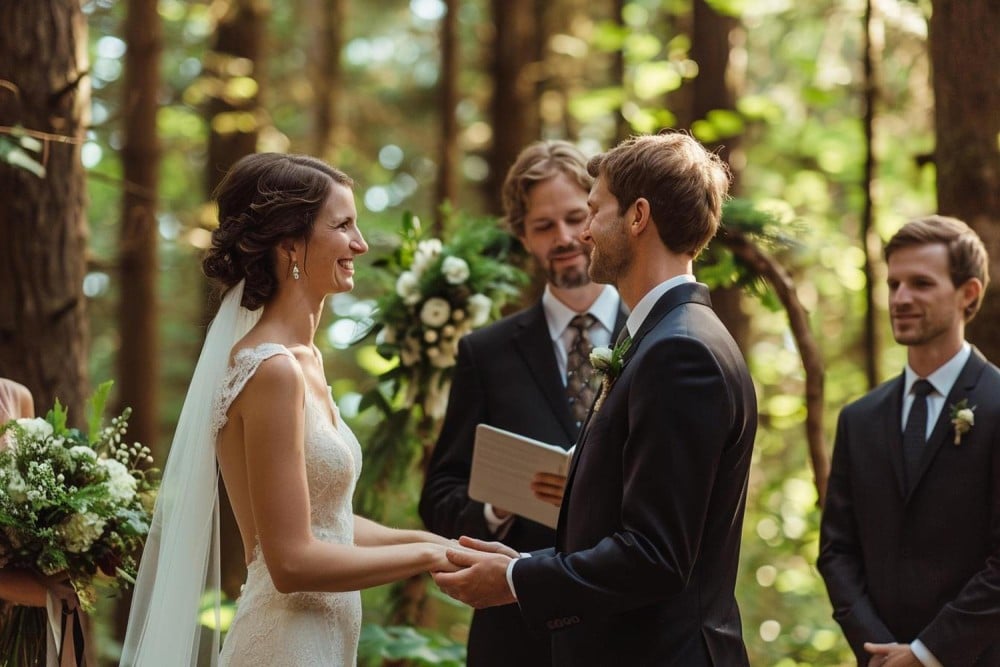 How to become a wedding officiant in tennessee ?Read more
How to become a wedding officiant in tennessee ?Read more How to bustle a tulle wedding dress ?05/21/2024Posted in: Wedding Fashion & StyleRead more
How to bustle a tulle wedding dress ?05/21/2024Posted in: Wedding Fashion & StyleRead more Planning Your Honeymoon Tips for an Unforgettable Trip05/20/2024Posted in: Wedding PreparationsRead more
Planning Your Honeymoon Tips for an Unforgettable Trip05/20/2024Posted in: Wedding PreparationsRead more The Dos and Donts of Wedding Guest Etiquette05/16/2024Posted in: Wedding Traditions & EtiquetteRead more
The Dos and Donts of Wedding Guest Etiquette05/16/2024Posted in: Wedding Traditions & EtiquetteRead more The Importance of PreWedding Counseling What You Should Know05/13/2024Posted in: Wedding PreparationsRead more
The Importance of PreWedding Counseling What You Should Know05/13/2024Posted in: Wedding PreparationsRead more Can I wear beige to a wedding ?11/14/2023Posted in: Wedding Fashion & StyleOne of the most common questions when it comes to wedding guest attire is whether it's appropriate to wear beige to a...Read more
Can I wear beige to a wedding ?11/14/2023Posted in: Wedding Fashion & StyleOne of the most common questions when it comes to wedding guest attire is whether it's appropriate to wear beige to a...Read more Do Jehovah Witnesses celebrate weddings ?02/29/2024Posted in: Wedding Traditions & EtiquetteJehovah’s Witnesses are known for their distinctive beliefs and practices, but what about weddings? In this...Read more
Do Jehovah Witnesses celebrate weddings ?02/29/2024Posted in: Wedding Traditions & EtiquetteJehovah’s Witnesses are known for their distinctive beliefs and practices, but what about weddings? In this...Read more What color shoes with navy dress for Wedding ?08/20/2023Posted in: Wedding Fashion & StyleMatching shoe color with navy dress When teaming shoe color with a navy dress, it's essential to decide on a hue...Read more
What color shoes with navy dress for Wedding ?08/20/2023Posted in: Wedding Fashion & StyleMatching shoe color with navy dress When teaming shoe color with a navy dress, it's essential to decide on a hue...Read more What to wear to a Church Wedding ?09/04/2023Posted in: Wedding Fashion & StyleAre you attending a church wedding and unsure about the dress code? Our latest article provides a deep dive into the...Read more
What to wear to a Church Wedding ?09/04/2023Posted in: Wedding Fashion & StyleAre you attending a church wedding and unsure about the dress code? Our latest article provides a deep dive into the...Read more What does a black wedding ring mean ?06/12/2023Posted in: Miscellaneous Wedding AspectsWedding rings are a traditional symbol of love and commitment, but their style and design can vary greatly. In recent...Read more
What does a black wedding ring mean ?06/12/2023Posted in: Miscellaneous Wedding AspectsWedding rings are a traditional symbol of love and commitment, but their style and design can vary greatly. In recent...Read more How to become a wedding officiant in tennessee ?06/27/2024Looking to become a wedding officiant in Tennessee but not sure where to start? This comprehensive guide will walk...Read more
How to become a wedding officiant in tennessee ?06/27/2024Looking to become a wedding officiant in Tennessee but not sure where to start? This comprehensive guide will walk...Read more How to bustle a tulle wedding dress ?05/21/2024Posted in: Wedding Fashion & StyleAre you a bride-to-be with a tulle wedding dress and wondering how to bustle it for the big day? Look no further!...Read more
How to bustle a tulle wedding dress ?05/21/2024Posted in: Wedding Fashion & StyleAre you a bride-to-be with a tulle wedding dress and wondering how to bustle it for the big day? Look no further!...Read more Planning Your Honeymoon Tips for an Unforgettable Trip05/20/2024Posted in: Wedding PreparationsPlanning your honeymoon is an exciting and important step in beginning your life together as a married couple. From...Read more
Planning Your Honeymoon Tips for an Unforgettable Trip05/20/2024Posted in: Wedding PreparationsPlanning your honeymoon is an exciting and important step in beginning your life together as a married couple. From...Read more The Dos and Donts of Wedding Guest Etiquette05/16/2024Posted in: Wedding Traditions & EtiquettePlanning to attend a wedding soon? Make sure you brush up on your wedding guest etiquette to ensure you have a great...Read more
The Dos and Donts of Wedding Guest Etiquette05/16/2024Posted in: Wedding Traditions & EtiquettePlanning to attend a wedding soon? Make sure you brush up on your wedding guest etiquette to ensure you have a great...Read more The Importance of PreWedding Counseling What You Should Know05/13/2024Posted in: Wedding PreparationsAre you and your partner considering pre-marriage counseling but not sure what to expect? This article is here to...Read more
The Importance of PreWedding Counseling What You Should Know05/13/2024Posted in: Wedding PreparationsAre you and your partner considering pre-marriage counseling but not sure what to expect? This article is here to...Read more













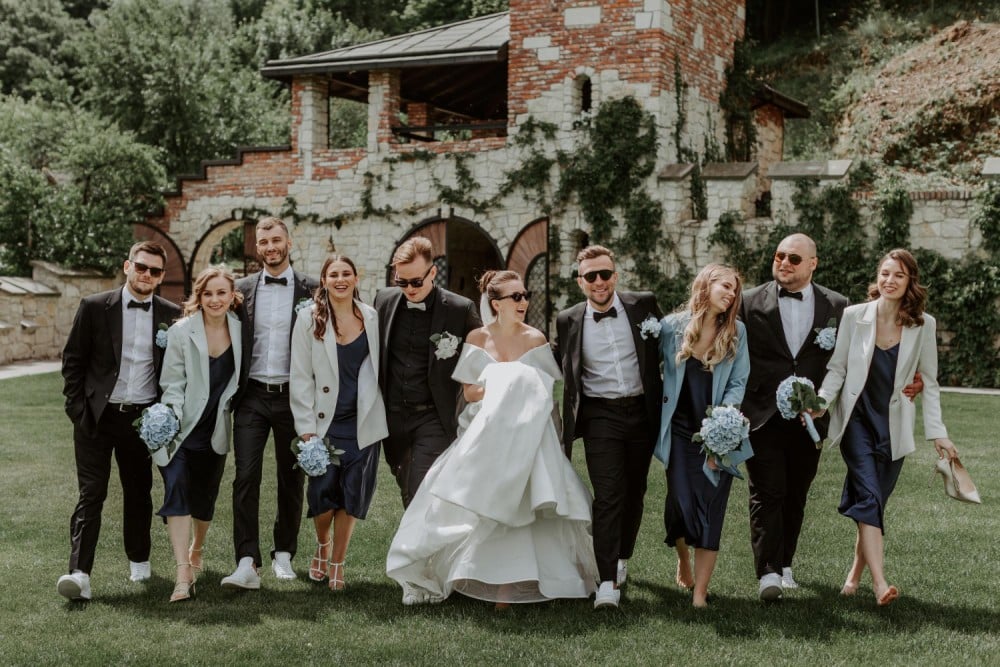
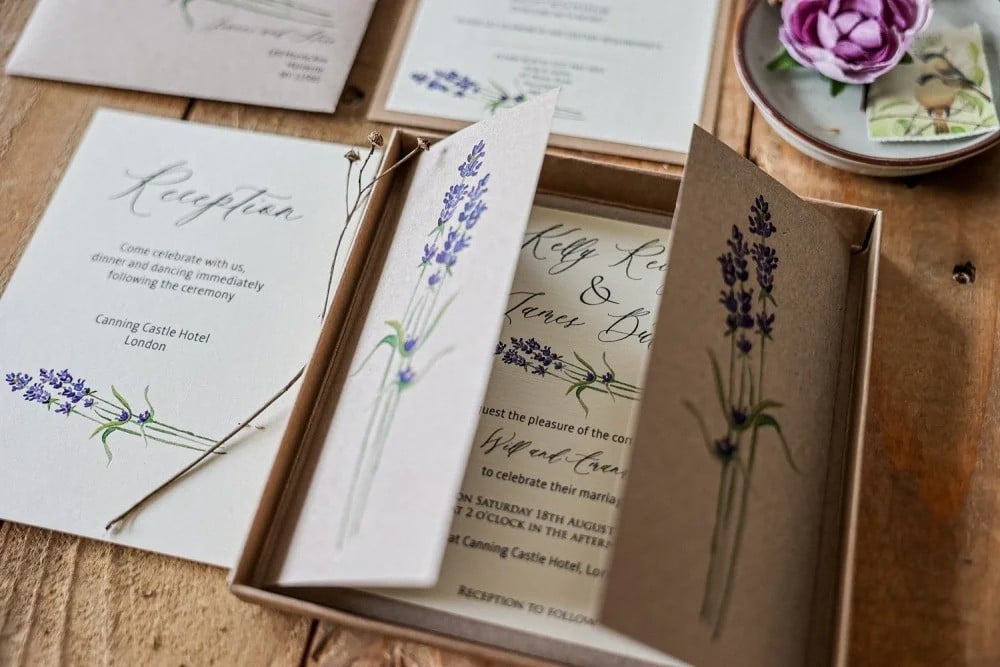

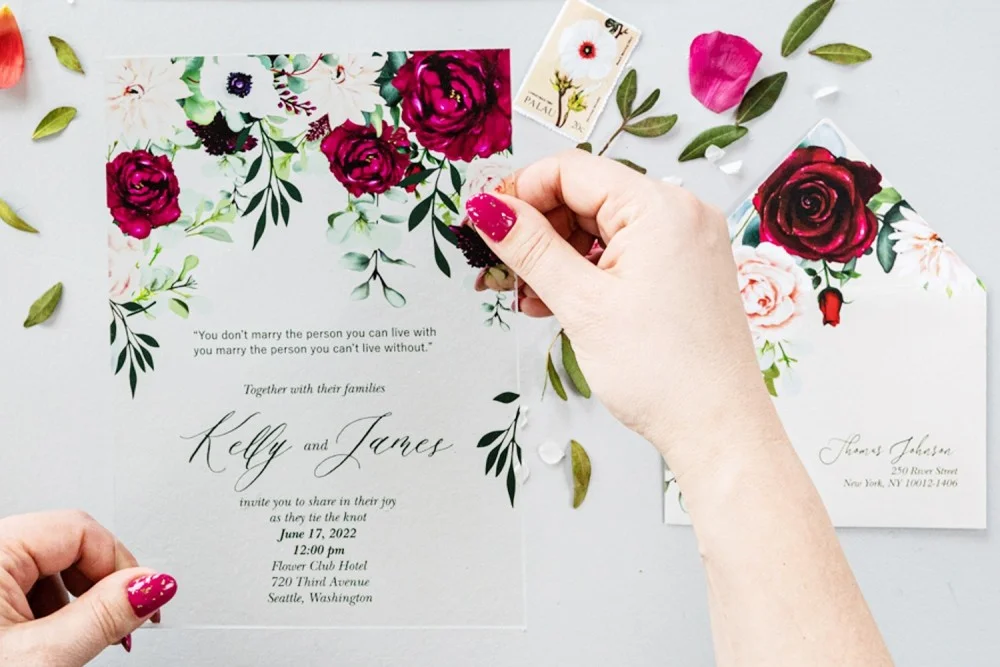


Top authors